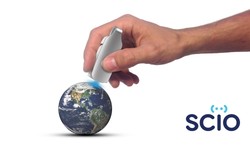Consumer spectrometer has anti-counterfeit applications
Phil Taylor, 17-Jul-2015
 A pocket molecular sensor being developed by Israeli firm Consumer Physics could put counterfeit detection into the hands of consumers.
A pocket molecular sensor being developed by Israeli firm Consumer Physics could put counterfeit detection into the hands of consumers.
The SCiO device is being developed with the help of nearly $3m in crowdfunding from the Kickstarter community and promises to make it possible to detect the molecular make-up of just about anything on the move.
Based on a well-established technology called near infrared (NIR) spectroscopy, SCiO can scan an item and communicate its findings to the user's smartphone. The physical basis for this material analysis method is that each type of molecule vibrates in its own unique way, and these vibrations interact with light to create a unique optical signature.
While NIR is widely-used in labs around the world, the apparatus used is far too bulky and expensive for consumer use. Consumer Physics has tried to miniaturise the technology and make it affordable, with the first of its handheld units on their way to early adopters and a consumer version due to launch later this year for around $250.
The company suggests a number of applications for the device, such as checking the calorie content of foods or checking which piece of fruit in the supermarket is ripe, although it notes the device is unable to detect material components in concentrations lower than 1 per cent, which would include most toxins, pesticides and bacteria.
Consumer Physics also suggests that it is possible to analyse tablets to see if they contain what they are supposed to, and early demonstrations of prototypes have shown that it can be used to identify a drug or nutritional supplement from a tablet, even if the packaging has been lost.
Of course, the system relies on having the signature of spectra of the material already in the database - the device will not be able to identify something that has not been encountered before and recorded.
"To build a working application or SCiO app, you first have to collect a database of spectrometric signatures (taken by SCiO) and their corresponding metadata," a spokesperson for the Tel Aviv-based company told SecuringIndustry.com.
"For example, detecting counterfeit materials will require planning, collection and creation of a database of both counterfeit and real samples."
Once a data collection is created, analytical algorithms can be built and applied to create the relevant model with a web-based database and development tool, and this is all done using the SCiO Developer Kit (SDK), which allows users to create their own data collections, models and apps.
The SDKs starting shipping to more than 1,000 backers last month, according to the company's Kickstarter page.
As all scans are processed via the cloud, it will be possible in the future to start developing a 'database of matter', which could become a valuable research tool in its own right, according to the company.
Related articles:

©
SecuringIndustry.com




 A pocket molecular sensor being developed by Israeli firm Consumer Physics could put counterfeit detection into the hands of consumers.
A pocket molecular sensor being developed by Israeli firm Consumer Physics could put counterfeit detection into the hands of consumers.